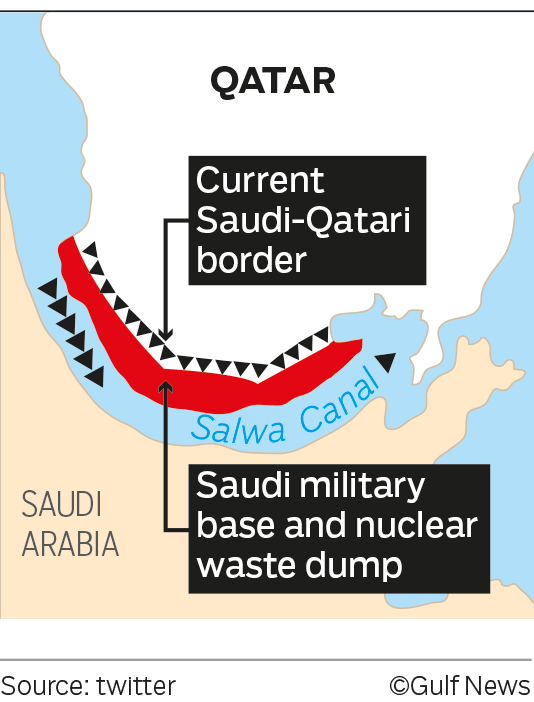The political rift between Qatar and Saudi Arabia may soon become a geographical rift, with the appearance in April 2018 of reports in two Saudi-state linked newspapers of plans to build a canal between the two countries which would turn Qatar into an island. The proposed ‘Salwa Canal’ would be funded by businessmen from Saudi Arabia and the United Arab Emirates (UAE) and would be 60 km long, 200m wide, and 15-20m deep. The canal would cost roughly 750 million dollars and stretch from Salwa to Khor Al Adeed. It would be within Saudi territory and would include resorts, seaports, marinas, and water sports facilities. In addition to including transportation and entertainment, the plan envisions the construction of a Saudi military outpost and a dumping area for nuclear waste from a proposed Saudi reactor.
Saudi Arabia’s animosity towards Qatar is part of an aggressive set of foreign and domestic policies, spearheaded by Saudi Crown Prince, Mohammed bin Salman (MbS). Known for his role in Yemen’s humanitarian disaster, another of his controversial initiatives has been the campaign against Qatar, which has effectively removed Qatar from the Gulf Cooperation Council. The severing of all relations with the peninsular kingdom has strained regional diplomatic relations and isolated Qatar from its Arab neighbors, namely Saudi Arabia, Egypt, the UAE, and Bahrain.
The origins of Qatar’s regional estrangement lie in its refusal to comply with an initial list of 13 demands made by Saudi Arabia, Egypt, the UAE, and Bahrain calling on Qatar to stop supporting terrorism, including the Houthi rebels in Yemen,. Qatar refused to accept the demands, arguing that they threatened its sovereignty and violated international law. Following this, Saudi Arabia, the UAE, and Bahrain imposed a number of restrictions on Qatar, including land, maritime, and air blockades.
MbS has used Saudi Arabia’s aggressive posture towards Qatar to create a common regional rival, with the dual aims of solidifying domestic support, and galvanizing regional allies to his cause against Qatar. The news of a planned canal, much less its construction, would deepen the rift between Saudi Arabia and Qatar and it comes in the aftermath of an intensification of repressive measures on independent civil society, and a crackdown on the prince’s rivals within the kingdom.
The kingdom’s aggressive move towards Qatar mirrors domestic acts of repression, as demonstrated by the arrests in September 2017 of dozens of prominent religious figures, writers, journalists, academics, and activists who were perceived to be critical of the government’s policies, including its policies towards Qatar. Those arrested included well-known human rights defenders and founders of the Saudi Civil and Political Rights Association (ACPRA), as well as popular clerics Salman al-Awda and Awad al-Qarni. Many of these arrests were directly linked to the Qatar crisis, as those detained were accused by the Saudi government of having received funds from Qatar and being party to a Qatari conspiracy against the Saudi state.
The arrests were conducted by the Saudi Presidency of State Security (PSS), an institution created by royal decree in July 2017, soon after MbS was appointed Crown Prince. The PSS reports directly to the king, rather than to a minister and has a broad mandate that covers counter-terrorism and domestic intelligence activities. This leeway reflects increased consolidation of power within the offices of the King and Crown Prince at the expense of other institutions, like the Ministry of Interior.
The PSS was granted further powers in November 2017, with the new anti-terrorism law giving it the legal authority to “arrest and detain people, monitor their communications and financial data, and search their properties and seize assets without judicial oversight.” In the same month, over two hundred princes and businessmen – including perceived rivals of MbS’ – were detained in the Ritz Carlton Hotel in Riyadh. More recently, the PSS was behind the arrests of a dozen women’s rights activists in May 2018, with seven of these activists being involved in the efforts of establishing a non-governmental organization, ‘Amina.’ The charges filed against these seven activists included “making suspected contact with and providing money to foreign circles” with a view to destabilizing the kingdom.
The recent, proposed move to literally make an island of Qatar runs parallel to MbS’ supposed restructuring of the kingdom’s security system. Given the newly formed security agency’s close links with the monarchy, the arrests conducted by the PSS can almost directly be attributed to MbS and thus illustrate his attempt to suppress independent civil society, and jail perceived dissidents and rivals. This effort at consolidating power at home, through coercively silencing independent voices including those opposed to an aggressive foreign policy against Qatar, is thus a perfect complement to the Crown Prince’s attempts to solidify power at a regional level by isolating Qatar diplomatically, and perhaps in the future, even geographically.
Malvika Verma and Tejal Ambardekar are Advocacy Interns with ADHRB





